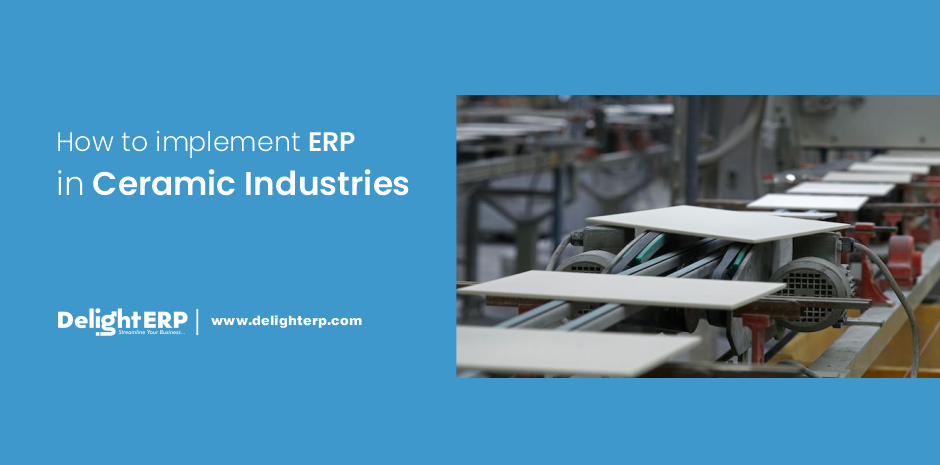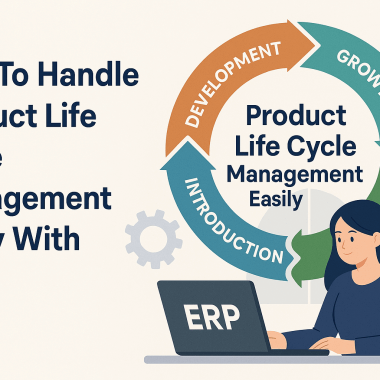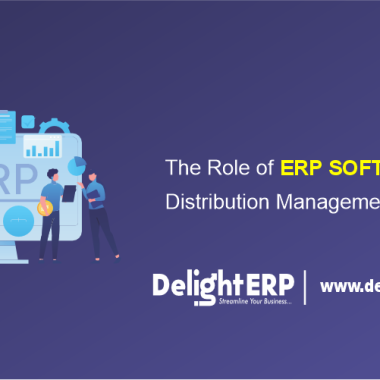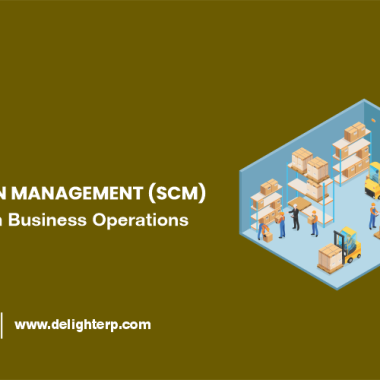Introduction
The challenges of Ceramics Manufacturing are unique, and beyond those relevant to the usual resource management. The most critical part of the process is the safe handling of customer orders within tight lead times.
Every industry is different. Each of them requires data organization and solutions that keep the management running smoothly. And Enterprise Resource Planning (ERP) is an ideal tool for that. Every industry requires an ERP solution that understands its requirements. Talking about Ceramic Industries, it would be a great challenge for them to operate without an ERP.
The ceramic industry faces a lot of challenges – from the procurement of raw materials from the miners or the vendors to deliver the final output. Ceramics have made their way into our lives in the way of utensils, tooth implants, tiles, sanitary ware, insulators, artwork, etc.
However, the current era being dependent and influenced by digital advancements has always forced industries to stay with the buzzing trend known as ‘Automation’. ERP for the Ceramic industry is designed to ease predictions on the consumer wish list and their needs. With such a large market to deal with, we have a supporting workforce that handles all the transactions and movements.
We have a ceramic-specific ERP which is a powerful management system to take strict control of business activities. ERP solutions for ceramic industries must be both highly organized and rigorous to keep all business activities in check. There are a lot of daily operations that take place in the ceramic industry – from production and transportation, purchasing and stocking, sales and inventory management to budget and quality management, there are data from every industrial process.
Delight ERP holds the reputation of continuously facilitating Ceramic Manufacturing industries in their necessary business procedures. It simply brings all information and processes involved under one roof thereby, letting the users access the resource irrespective of the fact where it was created.
In this blog, we will discuss the steps involved in implementing ERP in Ceramic Industries. Production of ceramic tiles for construction industry. Factory worker holding modern tile checking color texture and quality.
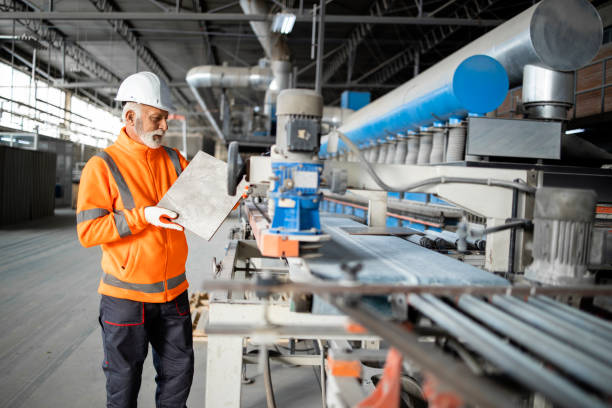
Top Ceramic Manufacturers of India:
-
Simpolo Vitrified Pvt. Ltd
-
Somany Ceramic Limited
-
Varmora Granito Pvt. Ltd
-
Kajaria Ceramics Limited
-
Cera Sanitaryware
-
HSIL Ltd.
-
Orient Bell.
-
Asian Granito India Ltd.
-
H R Johnson Tiles
-
Grindwell Norton Ltd.
Steps to Implement ERP in Ceramic Industries:
1. Define Business Requirements:
The first step in implementing ERP is to define the business requirements. The organization needs to identify the key business processes and the areas that require improvement. For instance, inventory management, order processing, and quality control are the areas that require significant improvement in the Ceramic Industry. The company needs to conduct a thorough analysis of its current processes, identify the gaps, and define the requirements to be addressed.
2. Selecting the Right ERP System:
After defining the business requirements, the organization needs to identify the right ERP system that can meet its needs. The selection process involves evaluating various ERP vendors, their functionalities, and features, and selecting the one that aligns with the company’s business requirements.
3. Planning and Execution:
Once the ERP system is selected, the company needs to plan and execute the implementation process. The implementation process involves several steps, including system configuration, data migration, and user training. The organization needs to create a detailed project plan, allocate resources, and define the roles and responsibilities of the team members involved in the implementation process.
4. System Configuration:
The system configuration involves setting up the ERP system as per the company’s requirements. The system configuration includes defining the workflows, creating user accounts, and setting up the system parameters.
5. Data Migration:
Data migration involves transferring the existing data from the legacy systems to the new ERP system. The organization needs to ensure that the data is clean, accurate, and consistent before migration.
6. User Training:
User training is a critical aspect of ERP implementation. The organization needs to train the end-users on how to use the ERP system effectively. This training should cover all aspects of the system, including data entry, reporting, and analysis.
7. Testing and Deployment:
After the system configuration, data migration, and user training, the organization needs to test the system thoroughly to ensure that it meets the business requirements. Once the system is tested, it can be deployed for use.
8. Continuous Monitoring and Improvement:
ERP implementation is an ongoing process, and the organization needs to continuously monitor the system’s performance and identify areas for improvement. The company needs to conduct regular system audits, address issues promptly, and provide training to users to optimize system usage.
Also check out: “Types Of Manufacturing Industries Surrounding Rajkot / Saurashtra Region”.
Here’s how to implement ERP in each production/manufacturing process in ceramic industries.
1. Raw Material Procurement:
ERP software can help streamline the raw material procurement process in Ceramic industries by providing real-time information about inventory levels, lead times, and supplier performance. The system can also automate the purchase order process and ensure that materials are delivered on time and at the right price.
2. Production Planning:
ERP software can help plan production schedules based on customer orders, inventory levels, and equipment availability. This can improve the accuracy of delivery dates and reduce the risk of stockouts or overproduction in ceramic industry.
3. Production Execution:
ERP software can track the progress of each production order in real-time, allowing managers to identify bottlenecks and make adjustments to the production process as needed. The system can also provide detailed information about product quality, labor costs, and machine utilization.
4. Quality Control:
ERP software can automate quality control processes of ceramic industries, ensuring that every product meets the required standards. The system can also track the source of any defects, allowing managers to take corrective action quickly.
5. Inventory Management:
ERP software can provide real-time information about inventory levels, including raw materials, work-in-progress, and finished goods. This can help prevent stockouts, reduce inventory carrying costs, and optimize order quantities.
6. Shipping and Logistics:
ERP software can streamline the shipping and logistics process by providing real-time information about order status, shipping schedules, and delivery tracking. This can improve on-time delivery rates and reduce shipping costs.
7. Financial Management:
ERP software can integrate with accounting systems to provide real-time financial information, including revenue, expenses, and profit margins. This can help managers make informed decisions about pricing, production volumes, and investment strategies.
8. Sales Forecasting:
ERP systems can help sales teams forecast sales based on historical data and current trends. By understanding sales patterns and trends, sales teams can adjust their strategies to meet demand and optimize their sales efforts. This can help them forecast sales more accurately and adjust their production plans accordingly.
9. Customer Relationship Management:
ERP systems can help track customer data, such as order history and preferences. This can help sales teams tailor their sales strategies to meet the needs of individual customers and improve customer retention. By understanding customer preferences and purchasing patterns, sales teams can identify cross-selling and upselling opportunities and increase sales.
Implementing an Enterprise Resource Planning (ERP) system in ceramic industries can provide several benefits, including:
1. Improved Inventory Management:
ERP systems can help ceramic industries track their inventory levels in real-time, enabling them to optimize their inventory levels and avoid stockouts or overstocking. This can help reduce inventory costs and improve supply chain efficiency.
2. Enhanced Production Planning:
ERP systems can provide production managers with real-time visibility into the production process, enabling them to plan and schedule production more efficiently. This can help ceramic industries reduce lead times and improve on-time delivery rates.
3. Better Quality Control:
ERP systems can help ceramic industries implement quality control processes throughout the production cycle, ensuring that products meet the required standards. This can help reduce defects and improve customer satisfaction.
4. Streamlined Financial Management:
ERP systems can help ceramic industries manage their financial processes more efficiently, including accounts receivable and payable, billing, and invoicing. This can improve cash flow and reduce the risk of errors and delays in financial reporting.
5. Improved Supply Chain Management:
ERP systems can help ceramic industries manage their supply chain more effectively, from procurement to delivery. This can help reduce lead times, improve supplier relationships, and increase supply chain visibility.
6. Enhanced Sales and Marketing:
ERP systems can help ceramic industries manage their sales and marketing processes more effectively, including customer relationship management and sales forecasting. This can improve customer satisfaction and retention, as well as revenue growth.
Overall, implementing an ERP system can help ceramic industries improve their operational efficiency, reduce costs, and increase profitability, leading to a competitive advantage in the market.
In conclusion,
ERP implementation is a complex process that requires significant planning, coordination, and execution. The organization needs to define its business requirements, select the right ERP system, plan and execute the implementation process, and continuously monitor and improve the system’s performance. With proper implementation, ERP can significantly improve the efficiency and productivity of the Ceramic Industry.
Delight ERP is one of the best ERP software company in Rajkot, Gujarat which provides the best features of ERP software with the latest technology.
Our best ERP system is a cost-effective solution to help you to establish a fully integrated & smart business. Our highly advanced cloud ERP software contains various modules that focus on essential business areas.

